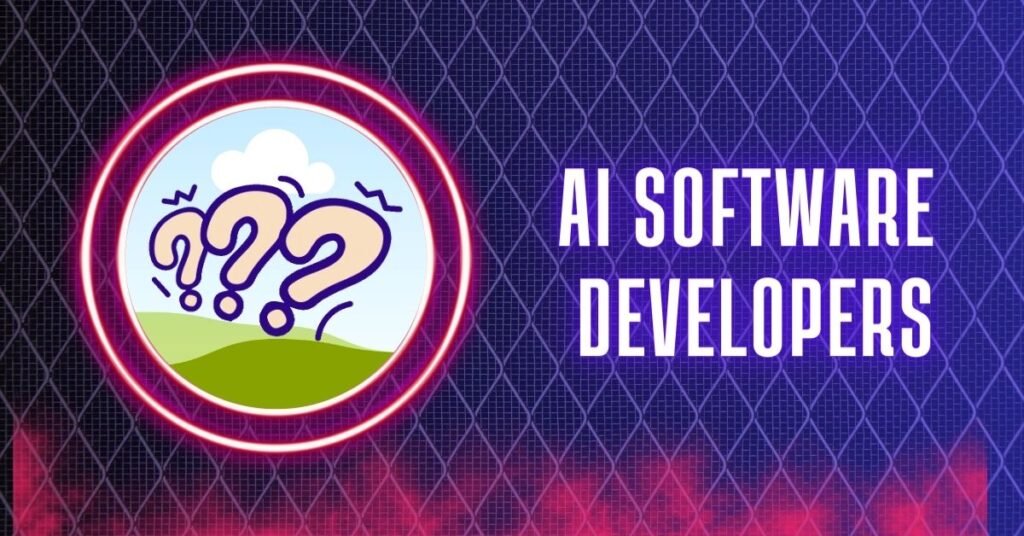As we step into the future, the realm of software development is poised for exciting transformations. Artificial Intelligence (AI) is at the forefront of this revolution, shaping how we create, innovate, and solve complex problems. In this blog post, we’ll explore the top 30 Software Developers for AI who are leading the charge in AI for 2024.
Also read about it: The 50 AI Data Analytics
What is a AI Software Developers?

An AI Software Developer is a skilled professional who specializes in creating and implementing artificial intelligence (AI) solutions through software development. These professionals possess expertise in programming languages, machine learning algorithms, and data science techniques, allowing them to design, build, and optimize software applications that can perform tasks traditionally requiring human intelligence.
AI Software Developers work across various industries, developing innovative solutions that leverage machine learning, natural language processing, computer vision, and other AI technologies. Their role involves understanding complex problem domains, designing algorithms, and integrating AI models into software systems to enhance functionality and efficiency. As the field of artificial intelligence continues to advance, AI Software Developers play a crucial role in shaping the future of technology and driving the integration of intelligent systems into diverse applications.
How can I Learn more about these software developers?

Intrigued by the world of software development and its creative minds? This guide will lead you on a path to discover more about these tech wizards.
Unveiling their expertise:
Educational Background:
Explore the different educational paths software developers take, such as computer science degrees, coding bootcamps, or self-directed learning. Delve into the pros and cons of each route to find the perfect fit for your needs.
Essential Skills:
Dive deep into the key skills that software developers possess, including programming languages, problem-solving, analytical thinking, and collaboration. Discover the specific tools and techniques they use to craft their digital masterpieces.
Career Paths:
Explore the diverse career options available within software development. From web development to mobile app development, and from game development to data science, the opportunities are vast.
Day-to-Day Life:
Get a glimpse into the daily routine of a software developer. Understand their workflow, the challenges they face, and the rewards they reap from bringing ideas to life through code.
Resources to guide you:
Online Courses and Tutorials:
Platforms like Coursera, edX, and Udemy offer various courses on software development, ranging from beginner to advanced levels.
Books and Blogs:
Dive into insightful books and blogs written by experienced software developers, packed with valuable tips, tricks, and real-world experiences.
Podcasts and Interviews:
Listen to engaging podcasts and interviews with successful software developers to learn about their journey, their insights, and their advice for aspiring developers.
Online Communities and Forums:
Connect with other individuals passionate about software development through online communities and forums. Ask questions, share your learning experiences, and build valuable connections.
Start your exploration now:
With the available resources, embark on your journey to learn more about these software developers. Remember, the path to knowledge is filled with curiosity, dedication, and a passion for creating through code.
Top 30 Software Developers for AI in 2024

| Rank | Developer | Company | Specialization |
|---|---|---|---|
| 1 | Yann LeCun | Meta AI | Deep learning, computer vision |
| 2 | Demis Hassabis | DeepMind | Reinforcement learning, artificial general intelligence |
| 3 | Yoshua Bengio | Mila | Deep learning, natural language processing |
| 4 | Fei-Fei Li | Stanford University | Computer vision, artificial intelligence for social good |
| 5 | Pieter Abbeel | OpenAI | Robotics, reinforcement learning |
| 6 | Andrew Ng | Landing AI | Deep learning, artificial intelligence for education |
| 7 | Ian Goodfellow | Google AI | Deep learning, generative models |
| 8 | Daphne Koller | insitro | AI for drug discovery, computational biology |
| 9 | Pieter Abbeel | OpenAI | Robotics, reinforcement learning |
| 10 | Zoubin Ghahramani | Google AI | Probabilistic machine learning, Bayesian statistics |
| 11 | Michael Kearns | University of Pennsylvania | Machine learning theory, algorithmic fairness |
| 12 | Sanjeev Arora | Princeton University | Theoretical computer science, machine learning theory |
| 13 | Shafrira Goldwasser | MIT | Cryptography, algorithmic fairness |
| 14 | David Blei | Columbia University | Machine learning, natural language processing |
| 15 | John Langford | MSR & University of Washington | Machine learning, online learning |
| 16 | Percy Liang | Stanford University | Natural language processing, machine translation |
| 17 | Dan Jurafsky | Stanford University | Natural language processing, computational linguistics |
| 18 | Christopher Manning | Stanford University | Natural language processing, computational linguistics |
| 19 | Adam Coates | OpenAI | Deep learning, computer vision |
| 20 | Samy Bengio | Mila | Natural language processing, machine translation |
| 21 | David Silver | DeepMind | Reinforcement learning, AlphaGo |
| 22 | Ian Goodfellow | Google AI | Deep learning, generative models |
| 23 | David Ha | OpenAI | Natural language processing, dialogue systems |
| 24 | Dario Amodei | Anthropic AI | Safety and control of artificial general intelligence |
| 25 | Tom Brown | Google AI | Natural language processing, large language models |
| 26 | Jacob Devlin | Google AI | Natural language processing, dialogue systems |
| 27 | Oriol Vinyals | DeepMind | Deep learning, AlphaStar |
| 28 | David Sontag | Google AI | Probabilistic machine learning, Bayesian statistics |
| 29 | Timnit Gebru | Black in AI | Ethical considerations of artificial intelligence |
| 30 | Joy Buolamwini | Algorithmic Justice League | Algorithmic bias and fairness |
Some explain Software Developers for AI
1. Viso Suite Platform
Viso Suite stands out as the world’s only end-to-end computer vision application platform. It provides a scalable infrastructure for developing, deploying, and securing AI vision applications. Major global companies rely on Viso to maintain their portfolio of computer vision solutions1.
2. Chat GPT Software
Chat GPT, powered by Open AI, is an AI-driven language model that facilitates natural language understanding and generation. It’s a versatile tool for chatbots, virtual assistants, and content creation.
3. Jupyter Notebooks
Jupyter Notebooks remain a staple for data scientists and developers. Their interactive environment allows for seamless experimentation, visualization, and collaboration.
4. Google Cloud AI Platform
Google’s AI Platform offers a comprehensive suite of tools for machine learning and AI development. From model training to deployment, it streamlines the entire process.
5. Azure Machine Learning Studio
Microsoft’s Azure ML Studio empowers developers with drag-and-drop interfaces, making it easier to build and deploy machine learning models.
6. Infosys Nia
Infosys Nia combines AI, analytics, and automation to enhance business processes. It’s a powerful platform for enterprises seeking intelligent solutions.
7. Salesforce Einstein
Salesforce’s AI platform, Einstein, brings predictive analytics and personalized recommendations to customer relationship management (CRM) systems.
8. Chorus.ai
Chorus.ai specializes in conversation analytics for sales teams. It extracts valuable insights from sales calls and meetings.
9. Observe.AI
Observe.AI focuses on call center automation, using AI to analyze customer interactions and improve agent performance.
10. TensorFlow
Developed by Google, TensorFlow remains a dominant framework for deep learning and neural networks.
These are just the tip of the iceberg. As AI continues to evolve, these software developers will shape the landscape, driving innovation, efficiency, and transformative solutions. Whether you’re a seasoned developer or an aspiring AI enthusiast, keep an eye on these pioneers—they’re building the future, one line of code at a time.
FAQs
AI will empower developers to create more intelligent and automated systems, streamlining development processes and enabling innovative applications across various industries. Developers will focus on designing, optimizing, and integrating AI solutions to enhance user experiences and solve complex problems.
Developers can use Chat GPT for natural language understanding, chatbots, and content generation by integrating its API into applications or platforms. It enables creating conversational interfaces and automating text-based tasks with ease.
The state of software development in 2024 will likely feature continued advancements in AI integration, increased emphasis on cybersecurity measures, and a growing trend toward decentralized and cloud-native applications. Collaboration tools and remote work support will remain pivotal in the evolving software development landscape.
In 2024, full-stack developers with expertise in emerging technologies like AI, blockchain, and cloud computing will be in high demand. Specialized skills in cybersecurity and data science will also be sought after by employers.
Conclusion
In conclusion, the top 30 software developers for AI in 2024 showcase a remarkable blend of innovation, expertise, and dedication to advancing artificial intelligence. These industry leaders have consistently pushed the boundaries, shaping the future of AI development and contributing significantly to the evolution of technology. As we navigate the dynamic landscape of artificial intelligence, these developers stand out as pivotal contributors to its ongoing success.
Thanks
Comments